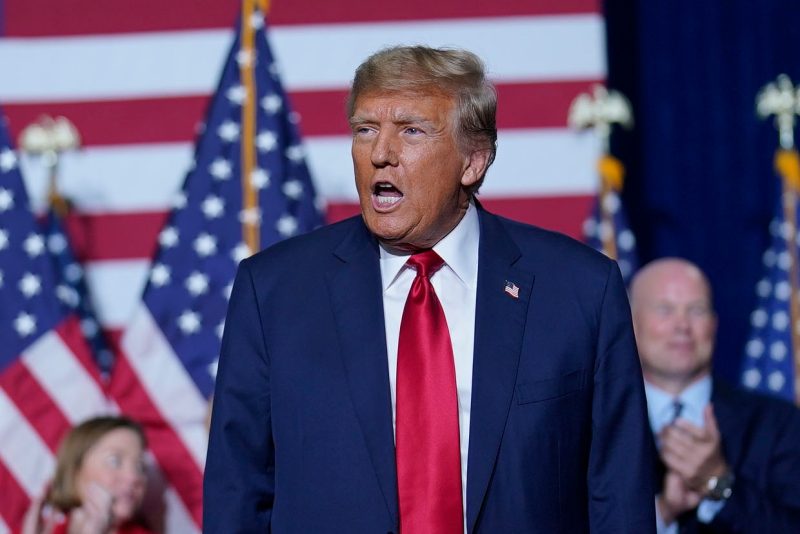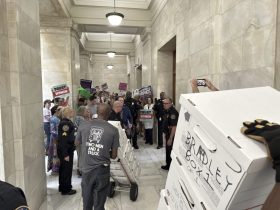A federal appeals court has rejected Twitter’s claim that Donald Trump should have been alerted to the existence of a search warrant for his data by prosecutors investigating interference in the 2020 election, leaving in place a $350,000 fine imposed on the social media company for not complying on time.
Twitter, now known as X, can still take its case to the U.S. Supreme Court. The case split the D.C. Circuit along partisan lines, with four Republican appointees saying Trump should have been able to argue some of the information from X be withheld from the government.
“Judicial disregard of executive privilege undermines the Presidency, not just the former President being investigated in this case,” Judge Neomi Rao wrote for the disagreeing group. The ruling comes as the same court considers another question of executive power — Trump’s claim to total immunity from prosecution. One of the four judges who joined the dissenting statement in the Twitter decision, Karen L. Henderson, is on the panel considering that argument.
The ruling that X appealed was of a court order barring the company from telling Trump or his attorneys about the existence of a January 2023 search warrant for his data and a subsequent sanction for not handing over the information on time. X argued that it had a First Amendment right to alert Trump, who might then fight the disclosure himself.
But X acknowledged that it did not have standing to make any claims on Trump’s behalf. No court has ruled on whether a former president can block a business from responding to a court order, or whether that right would outweigh a compelling need for secrecy during a criminal investigation.
X did ultimately turn over the information, two days after the Feb. 7 deadline imposed by the court. When Trump was indicted by special counsel Jack Smith in August on charges of obstructing Congress and thwarting people’s right to vote, several of the former president’s tweets were quoted as evidence. The special counsel also obtained 32 direct messages from Trump’s account, according to the court record.
X continued to fight the ruling in court, saying the warrant should have been put on hold until its First Amendments claims and any executive privilege claims from Trump played out in court. The Electronic Frontier Foundation, a civil liberties group, supported X with a brief calling the ruling a “drastic rewriting of First Amendment law.”
Three judges on the D.C. Circuit, all Democratic appointees, ruled in July that the nondisclosure order was a justifiable restraint on X’s speech because there was “reason to believe that disclosure of the warrant would jeopardize” a criminal investigation that had “national security implications.” In particular, the court said, Trump might destroy evidence, alert possible co-defendants to the existence of the investigation or even flee the country.
The full U.S. Court of Appeals for the D.C. Circuit left that ruling in place without comment.
Rao, a Trump appointee, contended that the D.C. Circuit has a record of “failing to recognize serious separation of powers concerns implicated by novel intrusions on the presidency.”
Rao highlighted her own dissent from a case in which the D.C. Circuit ruled lawmakers could seek Trump’s tax records from his accounting firm, a move the former president fought as a violation of the balance of power between Congress and the White House. In that case, the Supreme Court took neither side, sending the case back to the D.C. Circuit for more consideration “of the significant separation of powers issues raised.” After several more legal battles, the records were turned over.
A different panel of the D.C. Circuit ruled in 2021 against Trump when he claimed executive privilege over documents sought by the House committee investigating the Jan. 6, 2021, attack on the U.S. Capitol. The Supreme Court declined to reconsider that ruling, although Rao emphasizes that in doing so, the justices said there were “unprecedented” and “serious” questions raised by the case.
“It’s a remarkable shot across the bench, but I think it also overreads what the Supreme Court actually said in both of the cases she cites,” Steve Vladeck, an expert in national security law at the University of Texas, said of Rao’s statement. The case law on executive privilege is not so clear, he said: “As is so often the case with Trump, that’s because there haven’t been other cases like this.”








